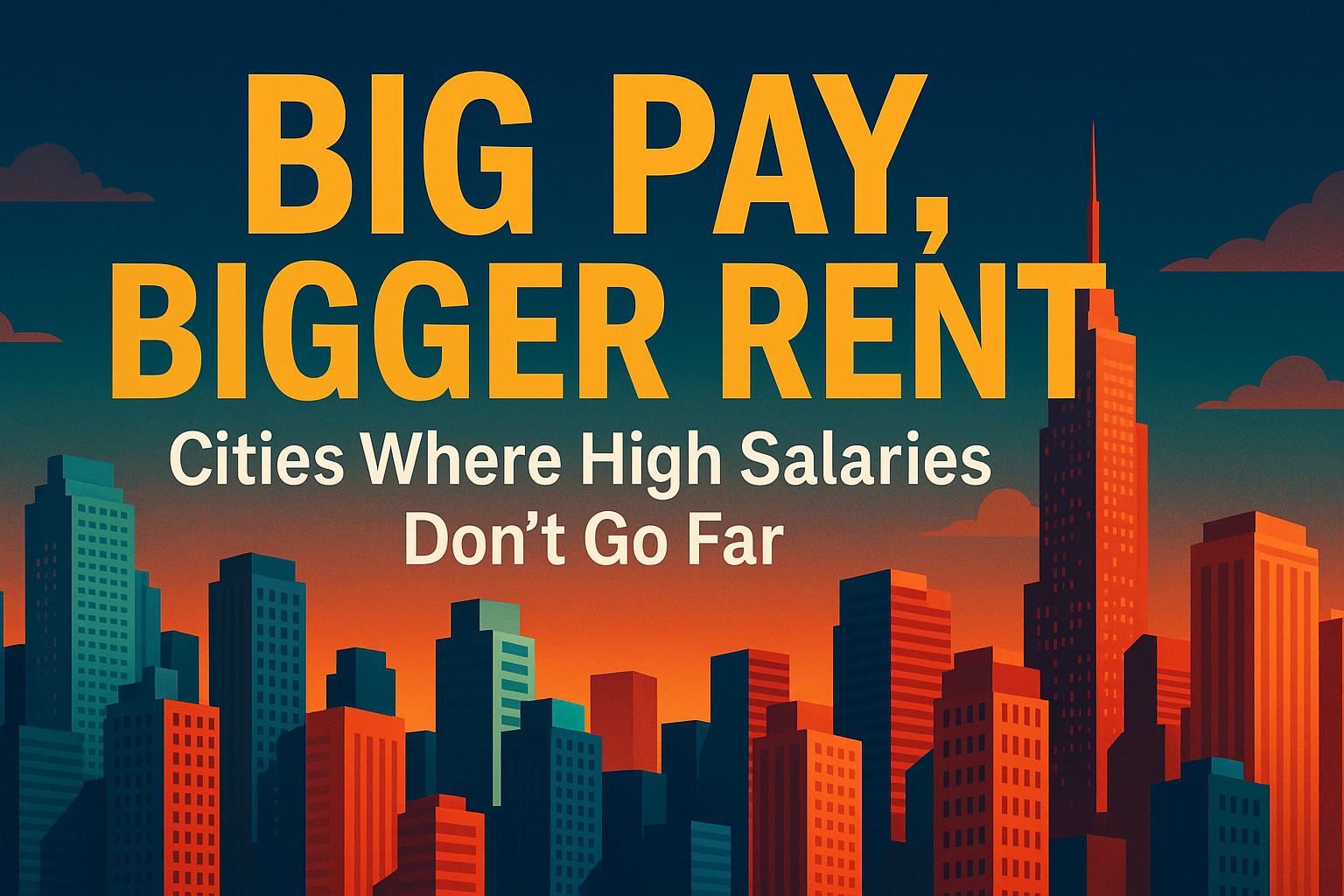Big Pay, Bigger Rent: Cities Where High Salaries Don’t Go Far
When we hear about cities with sky-high salaries, we often assume they’re dream destinations. But earning more doesn’t always mean living better. In fact, in many global cities, the cost of housing, taxes, and day-to-day life can swallow up your paycheck faster than you’d expect.
In this article, we explore cities where high average incomes don’t translate to a high quality of life—at least not for the average resident. We’ll break down where the money goes, why net income matters more than gross, and which cities are the biggest offenders.
The Illusion of Big Salaries
You might see headlines like “Average Software Engineer in San Francisco Now Makes $175K” or “London Tech Jobs Break £100K Barrier” and think: jackpot.
But the real question is: How much of that salary can you actually keep and enjoy?
That number depends on:
- Income taxes & social contributions
- Housing/rent prices
- Daily essentials (groceries, transport, healthcare)
- Childcare and schooling if applicable
When these factors are stacked up, some “high-paying” cities start to look… not so generous.
10 Cities Where High Salaries Get Eaten Alive
Below, we’ve ranked major global cities by the gap between high salaries and high fixed costs—with a focus on mid-to-senior level professionals earning between $70K–$150K per year.
1. San Francisco, USA
- Avg. Net Salary: ~$7,400/month
- Avg. Rent (1BR central): ~$3,600/month
- Rent as % of net income: ~49%
- Effective income tax rate: ~34%
Why it hurts: One of the highest salary cities in the world… but rent, state taxes, and cost of living wipe it out. You’ll save more working remotely from a different state.
2. Singapore
- Avg. Net Salary: ~$6,500/month
- Avg. Rent (1BR central): ~$3,100/month
- Rent as % of net income: ~48%
- Income tax: Low (~15%), but private healthcare is expensive
Why it hurts: Great take-home pay and tax rates, but housing is extremely tight, especially for expats without corporate housing packages.
3. London, UK
- Avg. Net Salary: ~$4,700/month
- Avg. Rent (1BR central): ~$2,600/month
- Rent as % of net income: ~55%
- Income tax: ~40% at higher income brackets
Why it hurts: High taxes and brutal rent means you’ll spend over half your income on housing—even before transport and food costs.
4. New York City, USA
- Avg. Net Salary: ~$6,100/month
- Avg. Rent (1BR central): ~$3,300/month
- Rent as % of net income: ~54%
- State + federal tax burden: ~36%
Why it hurts: Like SF, NYC salaries look great until you do the math. Add on $120/month subway cards and sky-high food prices, and your savings rate drops fast.
5. Sydney, Australia
- Avg. Net Salary: ~$4,000/month
- Avg. Rent (1BR central): ~$2,100/month
- Rent as % of net income: ~53%
- Tax rate: ~32.5% mid-tier
Why it hurts: Rent is consistently high, utilities are expensive, and private healthcare can be costly even with subsidies.
6. Hong Kong
- Avg. Net Salary: ~$4,800/month
- Avg. Rent (1BR central): ~$2,900/month
- Rent as % of net income: ~60%
- Income tax: ~15%
Why it hurts: High density and limited housing mean rent dominates budgets. You’ll need employer subsidies to make it work long-term.
7. Dublin, Ireland
- Avg. Net Salary: ~$4,300/month
- Avg. Rent (1BR central): ~$2,400/month
- Rent as % of net income: ~56%
- Income tax: ~40% effective
Why it hurts: Ireland’s booming tech scene draws top talent, but the housing crisis hasn't kept up—leaving young professionals squeezed.
8. Amsterdam, Netherlands
- Avg. Net Salary: ~$4,200/month
- Avg. Rent (1BR central): ~$2,300/month
- Rent as % of net income: ~55%
- Income tax: ~37–49%
Why it hurts: Limited rental availability, high demand, and little space to build push housing costs higher than most Dutch salaries can sustain.
9. Oslo, Norway
- Avg. Net Salary: ~$4,000/month
- Avg. Rent (1BR central): ~$2,000/month
- Rent as % of net income: ~50%
- Income tax: ~30–45%
Why it hurts: Norway offers incredible social benefits, but much of that is funded through taxation. Everyday costs (food, transport) are also high.
10. Paris, France
- Avg. Net Salary: ~$3,500/month
- Avg. Rent (1BR central): ~$1,800/month
- Rent as % of net income: ~51%
- Income tax: ~30–40%
Why it hurts: Culture and beauty aside, Paris is expensive to live in. Salaries lag behind other European hubs while costs remain stubbornly high.
What These Cities Have in Common
- Net salaries are deceptively tight. You may be earning big, but half or more goes straight to rent, taxes, and mandatory services.
- Demand outpaces supply. Most of these cities have housing shortages, driving up rent even for mid-income earners.
- Transport, food, and insurance costs stack up. These aren’t just “rent problems”—the full cost of city living eats away at disposable income.
- They’re often home to HQs and venture capital. High pay = high pressure = high prices.
What to Do Instead
If you're open to remote work, relocation, or just want more value from your income, consider:
- Lisbon, Portugal – Lower taxes (NHR scheme), cheaper rent
- Tbilisi, Georgia – 1% tax for freelancers, rent under $500/month
- Tallinn, Estonia – Flat 20% tax, strong infrastructure
- Kuala Lumpur, Malaysia – Affordable urban life + expat friendly
- Valencia, Spain – Cheaper than Madrid or Barcelona, high quality of life
- Prague, Czech Republic – Still affordable and well-connected
These cities may pay a bit less—but you'll save more and live better.
Final Takeaway
Don’t let high salaries fool you.
Look at net income, rent percentage, and total cost of living before jumping into a major city for work. Sometimes, a smaller paycheck in a smarter city is the real upgrade.
Use our city comparison tool to see where your income goes furthest.
